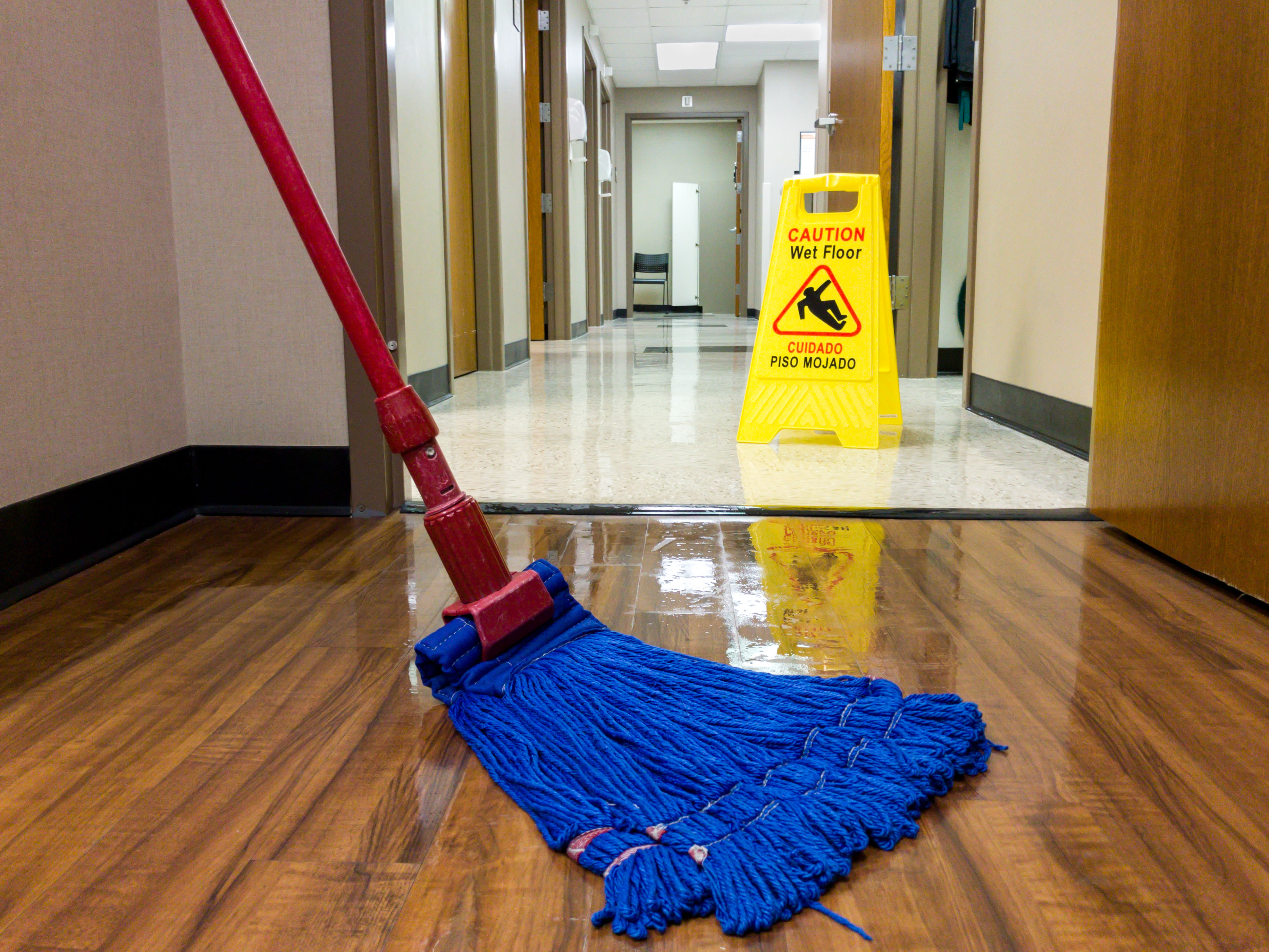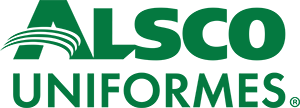
To disinfect any type of floor, start by sweeping away dust, dirt and hair. Have the right types of mops handy as well as a strong disinfectant.
A diluted bleach mixture, commercial disinfectant and isopropyl alcohol are all good choices. A vinegar solution can work quite well to clean floors, but it is a weak disinfectant. Depending on the type of floor, your approach will vary.
Disinfecting Hardwood Floors
If your facility includes hardwood floors, it is important to know which of the two types of hardwood floors you have.
Solid hardwood floors consist of planks that are milled from a single piece of timber. These types of floors can come in finished and unfinished (i.e., sealed and unsealed) styles. Engineered hardwood floors are, as the name implies, man-made from layers of material that have been glued together. They often have a thin layer of authentic hardwood on top of them and come finished with a clear protective coating.
To disinfect your hardwood floors, you should again prepare the floor for cleaning by removing any solid dust and debris. A dry mop or vacuum will make the floor surface clearer and easier to work with.
Because unfinished or unsealed hardware floors are porous, you should not use bleach on them, even if the bleach is diluted. However, you can use certain bleach-based disinfecting wipes or solutions on finished or sealed hardwood floors if the product instructions indicate they are safe to use on these surfaces. You can also use Lysol and other disinfectants, but check the product instructions to ensure that these products are safe for use on hardwood floors.
You’ll follow the same steps as outlined for vinyl floors by first sweeping or vacuuming the floor to remove debris. Prepare your disinfecting solution as appropriate. You don’t need to dilute Lysol’s multipurpose cleaner because you can use it at full strength on vinyl floors. Once you apply solution to the entire floor, allow it to sit for about five minutes to fully disinfect the floor.
Frequently rinse and wring out the mop when it gets dirty. When you’ve finished mopping, use a clean, absorbent cloth to dry the wood floors as soon as you finish.
If your facility has large hardwood floors that are sealed, you can also use a steam cleaner. There is no need to mix the water with anything because the heat from the steam is sufficient to disinfect the floor.
Steam cleaners work quickly but need special care. Specifically, steam cleaners must preheat until they are ready. Do not clean your hardwood floors before the cleaner is done preheating.
Some manufacturers recommend steam cleaning a surface for 20 seconds before moving to another surface. Consult the manufacturer’s instructions to determine how long the steam mop should remain on a surface. Then, repeat the process until you have effectively disinfected the entire surface.
Disinfecting Vinyl Floors
If your facility has vinyl floors, disinfecting them is fairly easy. In a pinch, all you’d need are plain water, a sponge mop and a disinfectant solution.
To disinfect your vinyl floors, start by dry mopping or vacuuming to eliminate surface dirt, dust, hair and other solid particles. Don’t neglect the spaces beneath your furniture, in the corners and along the baseboards. When you’ve finished dry mopping or vacuuming all those areas, you can turn your attention to wet cleaning and disinfecting.
A diluted bleach solution can work well to disinfect vinyl floors. Mix ¾ cup of bleach with 1 gallon of water. Then, clean your floors with a damp mop, and make sure you rinse the mop in hot water when it gets too dirty.
Because you are using bleach, wash your hands with soap for 20 seconds after you finish cleaning your floors. Doing so will protect your skin from the abrasiveness of the solution.
You can also create a mixture of white vinegar and a few drops of liquid dishwashing detergent. Mop once with the mixture, and mop a second time with just a vinegar and water solution. You can add some shine to your vinyl floor by putting a couple of drops of baby oil into the mixture.
Commercial disinfectant solutions are good choices for vinyl floors. There are bleach-based and bleach-free varieties to choose from as well as solutions designed specifically for vinyl floors.
Disinfecting Laminate Floors
If you have laminate floors in your facility, you need to use a slightly different process to disinfect them. As with all types of floors, use a dry mop or vacuum to remove solid dirt, dust and hair, and make sure you clean under furniture and along baseboards. Use warm, not hot, water because hot water can damage laminate floors.
Use diluted household bleach and water (4 teaspoons of bleach per quart of water). For laminate floors, make sure you mop at least once every other day. Clean the mop with alcohol or bleach solutions after use every time you use it. If you are cleaning floors with at least 70 percent alcohol, make sure you use alcohol solutions to clean the mop.
As with all floor types, you can also choose from commercial products to clean your laminate floors. Again, you’ll want to wear chemical resistant gloves and wash your hands thoroughly with soap when cleaning with bleach and other strong disinfecting solutions.
Use Alsco’s Floor Cleaning Supplies Service
At Alsco, we know how important clean floors are. Clean floors keep your employees safe and are critical for a positive first impression when customers enter your facility.
We provide the best cleaning products for floor care, including wet and dry mops, disinfecting solutions, microfiber mops and industrial towels. We can manage your inventory, so you don’t run low on supplies. When you’re ready, reach out to us to get started.
